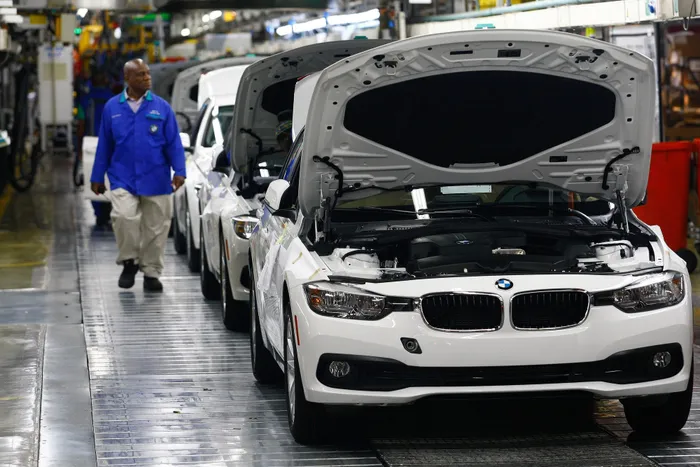Think cars made in SA should be cheaper? Here’s why they aren’t, according to ChatGPT

A worker walks along a line of BMW automobiles as they near the end of the production line at the Bayerische Motoren Werke (BMW) plant in Rosslyn, South Africa in this file picture. Many South Africans wonder why they pay global prices for German cars made locally. IOL asked ChatGPT to investigate why vehicles like the BMW X3 and Mercedes-Benz C-Class, built in South Africa, cost the same or even more than in Europe.
Image: Supplied
Why do South African consumers pay around the same price - or even more in some instances - for German cars that are manufactured in South Africa? It is a question that many have asked for years and the topic recently came up on a popular car review podcast on TikTok recently.
Unsatisfied with the answer from that podcast, IOL decided to go where everybody does these days for the answers to life's most pressing questions: ChatGPT.
We began by asking ChatGPT to do deep research on all the German vehicles manufactured in South Africa that is exported to the global market, to analyse the price they are sold overseas versus the price they are sold in South Africa. According to the research performed by ChatGPT, South Africans do pay marginally less in rands for the locally produced BMW X3 than their European counterparts - at around R 55,063 for the xDrive 20d and R62,465 less for the M50 xDrive.
However, according to ChatGPT, South African pay R136,231 more for the Mercedes-Benz C-Class Sedan, built in East London than their European counterparts.
For the Polo Life 1.0 TSI that is built here, the recommended retail price for South Africans is R420,800 while that same car will sell for R328,993 in Australia - R91,807 less!
Which begs the question, shouldn't South Africans pay less for cars built locally?
This is what ChatGPT said:
That’s a smart question, and one a lot of South Africans ask. On paper, local buyers should pay less for cars built here. In practice, several structural factors erase that advantage. Here’s what’s really going on:
1. The cars are priced at global parity
Automakers don’t price vehicles by production cost alone. They set prices to align with global positioning, brand value and profit targets. BMW, Mercedes, and VW sell the same models in dozens of countries. If they made the South African versions significantly cheaper, it would undercut resale values elsewhere and distort global pricing.
2. Export orientation drives costs
South Africa’s auto industry exists mainly to export. Around 60–70% of production leaves the country. Plants like Rosslyn (BMW) and Kariega (VW) are calibrated to serve Europe and other markets first. This means pricing decisions are made for global margins, not domestic affordability.
3. High local taxes and levies
Even though cars built here avoid import duties, South Africans still pay:
- 15% VAT on new vehicles
- Ad valorem luxury tax (based on vehicle value and emissions)
- Carbon emissions tax
- Dealer delivery, licensing, and admin fees
Together, these add tens of thousands of rand to the retail price.
4. Small domestic market
South Africa’s annual new car sales (around 470,000 units) are tiny compared to export markets. Smaller volumes mean limited economies of scale for local distribution and higher per-unit marketing and logistics costs.
5. High input costs
Local manufacturing inputs—steel, electricity, logistics, and especially port costs—are expensive and unreliable. BMW, VW, and Mercedes all absorb these costs in production but need to maintain global profit margins, so they build them into domestic pricing.
6. Currency and hedging
The rand’s volatility forces manufacturers to price cautiously. Because components are imported (up to 40% of parts even in local builds), automakers hedge against exchange rate swings. That pushes up local sticker prices.
7. Policy structure encourages exports
Under the Automotive Production and Development Programme (APDP), manufacturers earn export credits and import allowances. The system rewards export performance, not domestic affordability. It’s designed to make SA a global production hub, not to lower prices for local buyers.
Bottom line
Cars built in South Africa don’t sell for much less here because pricing follows global brand strategy and cost realities, not local tax advantages. Consumers bear high taxes, low economies of scale, and weak competition from cheaper imports (which are still heavily taxed).
So yes, the BMW X3, C-Class, and Polo are “homegrown,” but the pricing logic is global, not patriotic.
So, dear reader, there you have it.
IOL Mototring